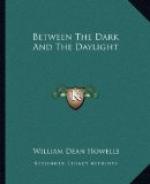He could not believe yet in his good-fortune. His countenance fell. “I’m afraid I don’t understand, or that you don’t. It doesn’t seem as if I could get to the end of my unworthiness, which isn’t voluntary. It seems altogether too base. I can’t let you say what you do, if you mean it, till you know that I come to you in despair as well as in love. You saved me from the fear I was in, again and again, and I believe that without you I shall—Ah, it seems very base! But the doctor—If I could always tell some one—if I could tell you when these things were obsessing me—haunting me—they would cease—”
Mrs. Yarrow rose, with rather a piteous smile. “Then, I am a prescription!” She hoped, woman-like, that she was solely a passion; but is any woman worth having, ever solely a passion?
“Don’t!” Alford implored, rising too. “Don’t, in mercy, take it that way! It’s only that I wish you to know everything that’s in me; to know how utterly helpless and worthless I am. You needn’t have a pang in throwing such a thing away.”
She put out her hand to him, but at arm’s-length. “I sha’n’t throw you away—at least, not to-night. I want to think.” It was a way of saying she wished him to go, and he had no desire to stay. He asked if he might come again, and she said, “Oh yes.”
“To-morrow?”
“Not to-morrow, perhaps. When I send. Was it young Doctor Enderby?”
They had rather a sad, dry parting; and when her door closed upon him he felt that it had shut him out forever. His shame and his defeat were so great that he did not think of his eidolons, and they did not come to trouble him. He woke in the morning, asking himself, bitterly, if he were cured already. His humiliation was such that he closed his eyes to the light, and wished he might never again open them to it.
The question that Mrs. Yarrow had to ask Dr. Enderby was not the question he had instantly forecast for her when she put aside her veil in his office and told him who she was. She did not seem anxious to be assured of Alford’s mental condition, or as to any risks in marrying him. Her inquiry was much more psychological; it was almost impersonal, and yet Dr. Enderby thought she looked as if she had been crying.
She had a difficulty in formulating her question, and when it came it was almost a speculation.
“Women,” she said, a little hoarsely, “have no right, I suppose, to expect the ideal in life. The best they can do seems to be to make the real look like it.”
Dr. Enderby reflected. “Well, yes. But I don’t know that I ever put it to myself in just those terms.”
Then she remarked, as if that were the next thing: “You’ve known Mr. Alford a long time.”
“We were at school together, and we shared the same rooms in Harvard.”
“He is very sincere,” she added, as if this were relevant.
“He’s a man who likes to have a little worse than the worst known about him. One might say he was excessively sincere.” Enderby divined that Alford had been bungling the matter, and he was willing to help him out if he could.




